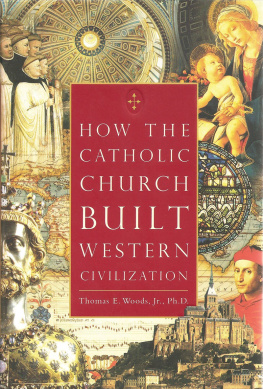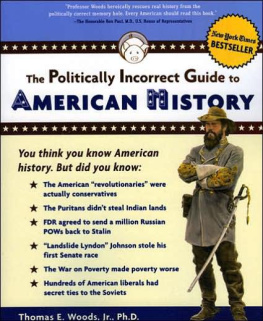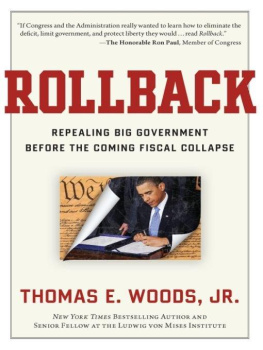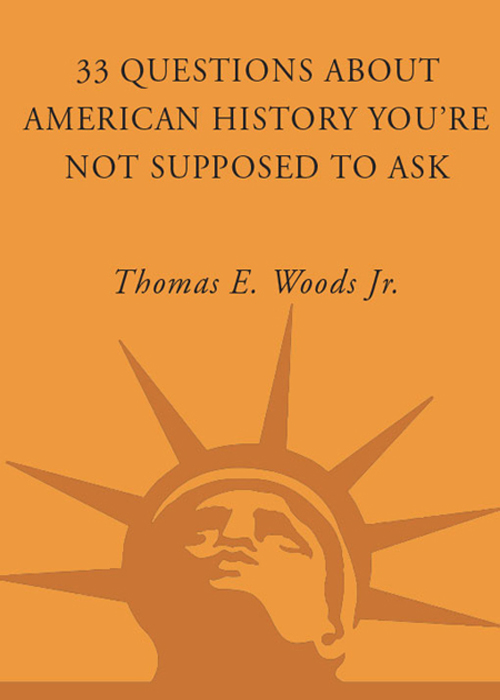
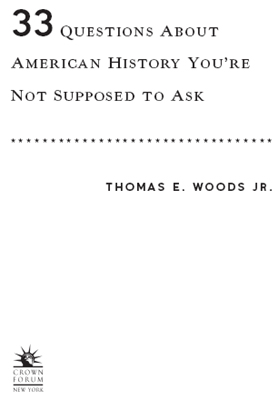
CONTENTS
QUESTIONS
To Heather
INTRODUCTION: HOAXES AND HISTORY

The truth, indeed, is something that mankind, for some mysterious reason, instinctively dislikes. Every man who tries to tell it is unpopular, and even when, by the sheer strength of his case, he prevails, he is put down as a scoundrel.
H. L. MENCKEN
M ost Americans have forgotten about the great bathtub hoax of early last century.
On December 28, 1917, the great journalist and social critic H. L. Mencken wrote A Neglected Anniversary for the New York Evening Mail. He regretted that the seventy-fifth anniversary of the invention of the bathtub had passed without any official acknowledgment by any sector of society. Mencken then took it upon himself, on this important occasion, to recall some of the basic history of the bathtub.1
The bathtub, Mencken explained, originated in England, where it began as rather a puny thing, little more than a glorified dishpan. Filling and emptying the water required the work of a servant. Adam Thompson, an American who dealt in cotton and grain, got the idea that the bathing process would be simplified and improved if the water could be transported to the bathtub by means of a system of pipes, and then discarded by the same method.
Thompson pursued the idea, and on December 20, 1842, at his home in Cincinnati, he took the first bath in the first bathtub.
Within days the new invention was the talk of the town. The bathtub became the subject of surprisingly energetic debate. Naturally, a great many Americans delighted in Thompsons invention. But to some critics, the bathtub was a dangerous luxury that would undermine the republican simplicity of American society. The medical profession even denounced it as a health hazard.
Millard Fillmore became the first president to use a bathtub in the White House, where one was installed in 1851. The presidents example quieted much of the opposition to the bathtub, which rapidly gained acceptance.
In the wake of Menckens article, this rudimentary history of the bathtub quickly became the standard account.
But there was a little problem. Mencken had made the whole thing up.
The bathtub had not originated as a glorified dishpan and had not been invented in Cincinnati in 1842 by anyone named Adam Thompson. The medical profession had never opposed the bathtub. What the actual history of the bathtub may be I dont know, Mencken later confessed. Digging it out would be a dreadful job, and the result, after all that labor, would probably be a string of banalities.2
That the article was a hoaxa burlesque history of the bathtub, Mencken later called itshould have been clear enough from the beginning, he thought; it was filled with obvious absurdities from start to finish.3 But the confident and authoritative tone in which he wrote it, combined with its citation of impressive-sounding (but nonexistent) periodicals, secured the articles triumph over common sense.
Mencken had hoped people might enjoy his clever, but certainly not serious, rendition of the history of the bathtub. But he found that they enjoyed it rather too much, not only accepting his narrative at face value but even, in the case of some readers, writing to him to corroborate facts he had invented! Pretty soon, Mencken recalled, I began to encounter my preposterous facts in the writings of other men. They began to be cited by medical men as proof of the progress of public hygiene. They got into learned journals. They were alluded to on the floor of Congress. Finally, I began to find them in standard works of reference.4
Mencken recounted his bathtub ordeal not because it is singular, but because it is typical. It is out of just such frauds, I believe, that most of the so-called knowledge of humanity flows. What begins as a guessor, perhaps, not infrequently, as a downright and deliberate lieends as a fact and is embalmed in the history books. Mencken made particular reference to the propaganda that was permitted to spread during the years of World War I: How much that was then devoured by the newspaper readers of the world was actually true? And although much effort was expended in overturning the myths that spread during the Great War, Mencken maintained that every one of those fictions retains full faith and credit today.5
My cynicism doesnt run as deep as Menckens, which may be why the longevity of certain historical myths, and the slogans and platitudes that support them, still manage to surprise me. This book punctures many of them. It poses 33 questions about American history for which the typical answers are either misleading, grossly unsatisfactory, or clearly and demonstrably wrong. Worse than the standard answers to these questions is that many of them are simply never raised in the first place, since they may give rise to forbidden thoughts that run counter to established opinion.
Nobel laureate F. A. Hayek once observed that our understanding of history decisively influences our interpretation of current events.6 The less real history we know, the more susceptible we become to manipulation by shysters. No, Adam Thompson didnt invent the bathtub in Cincinnati in 1842. That harmless myth has, at long last, finally perished. Let us begin to emancipate ourselves from other specimens of phony history that, even more widespread than Menckens bathroom hoax, are no less foolish and far more dangerous.
QUESTION 1
DID THE FOUNDING FATHERS SUPPORT
IMMIGRATION?

T hough polls consistently find that a majority of Americans believe immigration levels need to be reduced, many people still assume that the right of immigration is a hallowed American principle that no loyal citizen can consistently oppose.
This assumption is false.
Actually, the Founding Fathers were generally wary of immigration. They did not wish to exclude it altogether, but they saw no particular need to encourage it, especially among migrants whose cultural backgrounds were significantly different from their own.1
Consider Benjamin Franklin, that well-known cosmopolite and child of the Enlightenment. Franklin, it turns out, said quite a few politically incorrect things about non-British humanity (a category that includes the present writer). On one occasion he asked, Why should Pennsylvania, founded by the English, become a colony of aliens, who will shortly be so numerous as to Germanize us, instead of our Anglifying them, and will never adopt our language or customs any more than they can acquire our complexion?2 Thus immigrants of sufficient number and concentration could radically change the cultural landscape in ways that the native population might not want.
We can already hear the modern liberal laughing at Franklin, pointing triumphantly to German assimilation in America as proof that the Pennsylvanians concerns were without merit. But the point here is simply this: if unrestricted immigration had really been a traditional American principle, someone must have forgotten to tell Benjamin Franklin. And he was speaking of people who, as fellow heirs and architects of Western civilization, shared a great deal in common with the original settlers of British America. One can only imagine what Franklin would have had to say about current immigration policy.
Next page

